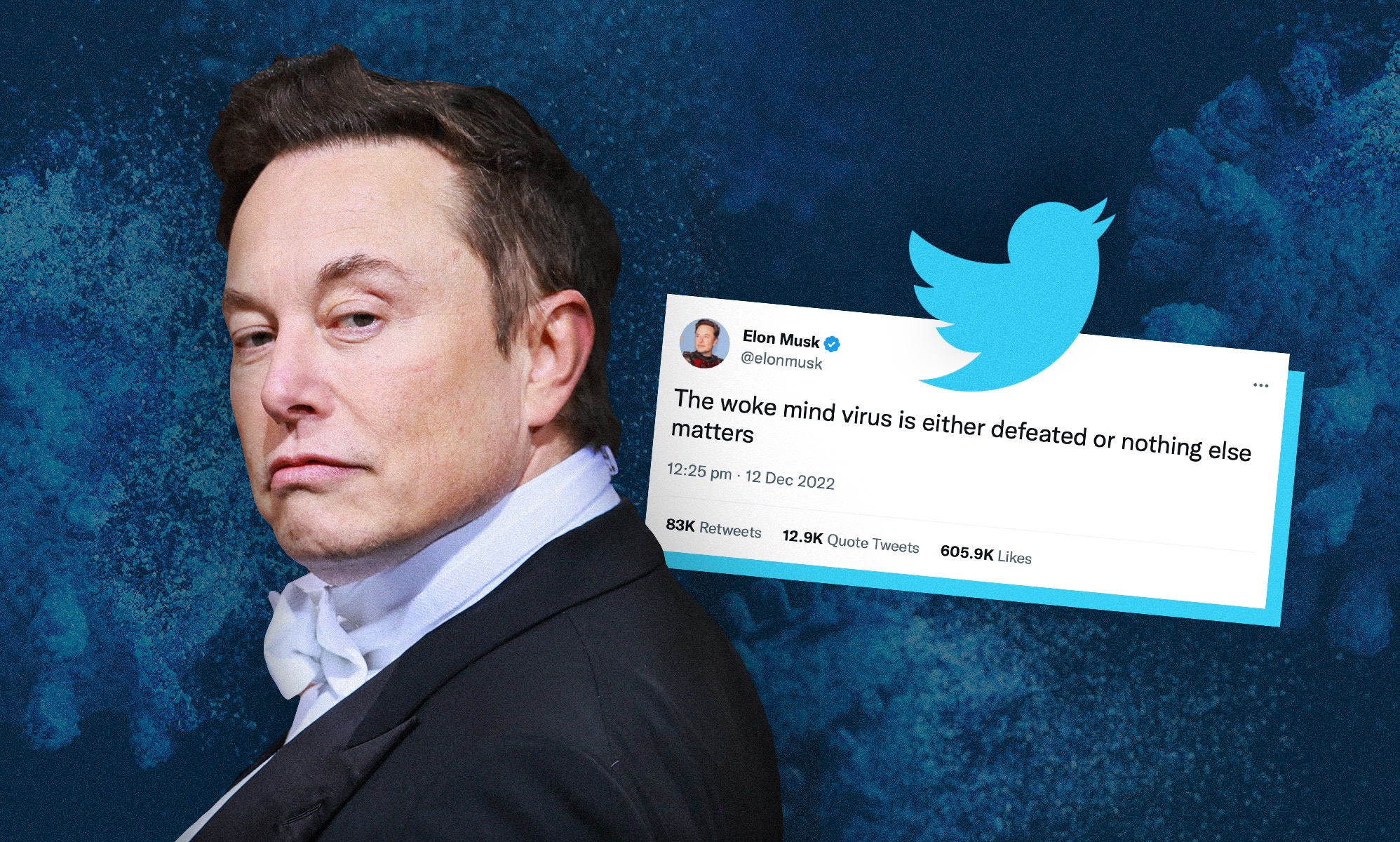Is a cultural shift underway, reshaping the very fabric of how we think and interact? The "woke mind virus," a term that has ignited debates across social and political spheres, encapsulates a profound anxiety about the direction of contemporary thought. This phrase, rapidly gaining traction, particularly in conservative circles, points to a perceived threat to traditional values and a critique of progressive ideologies.
The "woke mind virus" is more than just a catchy phrase; it's a lens through which some view the evolution of social justice movements and their impact on society. Originating in the early 2020s, the term has become a catchphrase, particularly online, used to describe what is perceived as the spread of a particular ideology, often linked to social justice movements. This ideology, critics argue, prioritizes identity politics and challenges established norms and principles. The term has been employed by various figures, including Elon Musk, to articulate concerns about specific cultural shifts and their effects.
| Aspect | Details |
|---|---|
| Term | Woke Mind Virus |
| Origin | Early 2020s, popularized online, particularly by conservative thinkers. |
| Description | A term used to critique progressive or social justice ideologies. It suggests that the concept of being "woke" has evolved into an infectious and potentially harmful ideology. |
| Associated Ideas |
|
| Prominent Users | Elon Musk, Ron DeSantis, and conservative commentators. |
| Context | Often discussed in relation to social justice movements, political correctness, and debates about free speech and meritocracy. |
| Criticisms | Accusations of oversimplification, generalization, and misrepresentation of complex social issues. |
| Related Terms |
|
| Impact | Fueling the culture wars. |
| Example | "I think we need to be very careful that we dont slip into a situation where we are unduly suppressing opinions that are not popular." - Elon Musk |
| References | MSNBC |
The genesis of this term, its evolution, and its implications within our society is multifaceted. The term's usage often revolves around criticisms of progressive ideologies and their potential impacts on cultural norms. The central contention revolves around the idea that awareness of social injustices has transformed into an all-encompassing ideology. Critics argue that this ideology spreads uncritically, potentially damaging traditional values and rational discourse. Those who employ the term frequently express concerns about what they perceive as an erosion of meritocracy, an emphasis on identity politics, and constraints on free speech.
- Salt Trick Benefits Myths 15second Secret
- Pastor Brandon Biggs Prophecies Trump Warnings Church Insights
Elon Musk, the CEO of Tesla and SpaceX, has prominently voiced concerns about the "woke mind virus," particularly regarding its impact on societal values and individual expression. In an interview with Bill Maher, Musk articulated his thoughts on the subject, further solidifying the term's presence in the ongoing cultural conversations. His perspective, as with many, has roots in the context of societal shifts and in response to the perceived dominance of certain ideologies. The term is used to describe and critique a perceived set of beliefs, values, and behaviours associated with social justice movements and progressive circles.
The term "woke" itself, originally associated with heightened awareness of social injustices, has become a lightning rod for debate. It has evolved from its initial context into a complex concept that often carries negative connotations, particularly among those critical of certain social justice movements. The very notion of "wokeness" is frequently debated, with critics arguing that it has evolved into an exclusionary ideology that suppresses dissenting views and undermines free speech.
The cultural and political landscape today is fraught with discussions around the "woke mind virus." It's often cited by conservative thinkers and commentators to express their criticisms of what they see as an overemphasis on identity politics and an undermining of traditional values. The term is sometimes used to critique the perceived limitations of groupthink and the pressures of online or offline "mobbing," where individuals feel compelled to conform to a certain viewpoint to avoid social ostracism. This dynamic, some argue, stifles open debate and critical thinking.
Florida Governor Ron DeSantis has also incorporated the term "woke" and its derivatives into his political messaging, particularly in legislative contexts. This adoption underscores the increasing politicization of the term and its significance in debates about cultural values and social policy. Governor DeSantis has, in his statements, demonstrated his commitment to contesting this perceived ideology. This political usage highlights the term's widespread impact.
The roots of the "woke mind virus" can be traced back to the evolution of the "woke" concept, which evolved from an awareness of social justice issues and systemic inequalities. Over time, critics argue that the "woke" mentality has transformed into a rigid ideological framework. It is believed that it prioritizes identity politics over meritocracy and creates a climate where dissenting views are silenced or condemned. The "woke mind virus" label can be seen as a backlash against the increasing influence of these ideological trends.
The origins of this term are complex, with ties to both computer science and cultural commentary. The term "traceroute woke_mind_virus" that Elon Musk tweeted in 2021 reveals an attempt to pinpoint the root of this phenomenon. The use of the "virus" metaphor reflects the idea that the ideology spreads and infects the minds of individuals. This metaphor is further reinforced by the idea of groupthink, in which a group of people share the same opinions without considering other viewpoints. Furthermore, mobbing, in which one persons view is singled out and attacked by a larger group, can also spread.
The "woke mind virus" is often described as an "insidious and pervasive online condition." Those who subscribe to the idea believe that it leads to a fixated adherence to a particular ideology or belief system, leading to what some consider a chilling effect on free expression and critical thought. This creates an environment where dissenting viewpoints are viewed with skepticism or dismissed entirely. The term also raises discussions about the role of social media in shaping opinions and the potential for echo chambers to reinforce existing beliefs. In this context, those critical of the term may be more concerned with addressing systemic inequalities and promoting diversity, rather than promoting the opposite.
The use of the term also brings attention to the ongoing debates around the role of corporations in social and political issues. Many companies have adopted social justice initiatives, which have, in turn, led to criticism from those who see these efforts as performative or as a form of virtue signaling. The argument here is that these actions don't translate into actual change, but serve to further the spread of the perceived "woke mind virus." The debate also addresses the role of social media and its potential to promote, or suppress, various viewpoints.
The concept of the "woke mind virus" taps into anxieties about contemporary society, particularly the rise of social justice movements and the cultural impact of progressive ideologies. It reflects a broader debate about the direction of society, cultural values, and individual freedoms. This debate often touches on freedom of expression, meritocracy, and the role of corporations in social and political issues. Understanding this term requires recognizing its place in the context of these broader societal conversations.
One point of criticism revolves around the vagueness of the term "woke mind virus." Despite its widespread use, its exact meaning remains fluid and subject to interpretation. It is open to different meanings and can be used to describe different phenomena. While some critics see it as a valid critique of certain ideological trends, others view it as a broad generalization. This makes it difficult to assess the term's accuracy and relevance.
The term also calls attention to the history of political correctness, and the evolving nature of language. In the past, political correctness served as a way to promote sensitivity and respect, but it has also been criticized for stifling free speech. "Woke" is often used to discuss the potential of new restrictions on speech. The historical context reveals a constant shift in the cultural landscape, with the "woke mind virus" representing the latest iteration of this cycle.
Richard Dawkins's essay "Viruses of the Mind" can provide some useful background on the subject. He explored the idea that ideas can spread like viruses, infecting and influencing minds. This concept provides a framework for understanding how the "woke mind virus" could be used to describe the spread of ideas. This also highlights the role of language and ideas in shaping how people think and behave. Dawkins's analysis also offers a more specific way of looking at the "woke mind virus" phenomenon.
- Viral Pastor Brandon Biggs Predicted Trump Assassination Attempt
- Undress Ai Free Tools Ai Photo Editing Now


